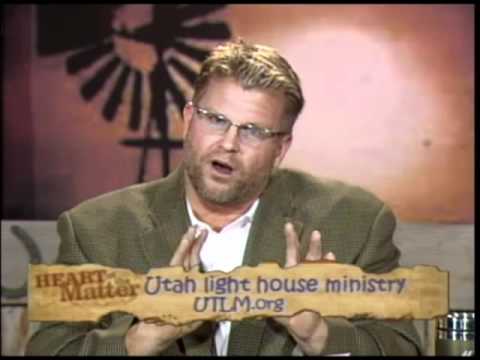
Father Figure
Shawn McCraney explores Joseph Smith Jr.'s family influence, highlighting Universalism, restorationism, and visionary traditions shaping Mormonism, contrasting with mainstream Christianity.

Shawn McCraney explores Joseph Smith Jr.'s family influence, highlighting Universalism, restorationism, and visionary traditions shaping Mormonism, contrasting with mainstream Christianity.

Shawn McCraney's "Heart of the Matter" unites diverse religious groups, exploring Mormonism's origins and Joseph Smith's influence through music, fellowship, and discussion.

Shawn McCraney hosts "Heart of the Matter" in Salt Lake City with guest Sandra Tanner, discussing LDS history and Joseph Smith. Tune into "The Infallible Word" Mondays.

Shawn McCraney's "Heart of the Matter" contrasts Biblical Christianity with Mormonism, emphasizing spiritual rebirth, historical understanding, and trust in Jesus over doctrine.

Shawn McCraney stresses being born again through Jesus, transcending religion. He targets those unfulfilled by LDS, urging sincere commitment to God for transformation.

Shawn McCraney stresses undiluted faith in Jesus' grace, warning against human efforts for salvation. True faith relies on grace, not works, for genuine transformation.

Shawn McCraney critiques LDS secrecy, advocates for transparency, emphasizes Jesus over religious structures, and stresses salvation by grace through faith, not works.

Shawn McCraney critiques the LDS Church's focus on the Aaronic Priesthood, arguing it's obsolete post-Christ. He emphasizes faith in Jesus over past symbols and rites.

Shawn McCraney contrasts Mormonism and Christianity, emphasizing the biblical view of hell as eternal punishment, unlike Mormonism's multi-tiered afterlife.

Shawn McCraney questions the need for prophets in modern Christianity, emphasizing Jesus' fulfillment of the Law and Prophets, advocating direct relationship with God through Jesus, the Word, and the Holy Spirit, rendering human mediators unnecessary.

Sabbath is Saturday, not Sunday; Old Covenant laws replaced by New Covenant in Jesus; focus on spiritual rest, not legalism; LDS misinterpret Sabbath; faith over rules.

Shawn McCraney critiques LDS worship practices, emphasizing faith in Jesus alone, rejecting Joseph Smith's focus. He advocates personal faith over organized religion.

Shawn McCraney contrasts Jesus in Christianity and Mormonism, emphasizing biblical worship as divine, critiquing Mormon views for lacking deep devotion and reverence.

Shawn McCraney contrasts grace as a free gift with LDS views linking it to righteousness, critiques religious facades, and explores differing beliefs on Jesus' conception.

Shawn McCraney critiques LDS adherence to rules, promoting a personal relationship with Jesus for spiritual fulfillment. He contrasts LDS and biblical views on sin and redemption.

Shawn McCraney advocates for marginalized LDS members, emphasizing a personal relationship with Jesus. He challenges Mormon narratives, promotes understanding, and highlights angels' biblical roles.

Shawn McCraney critiques modern tolerance, challenges LDS claims, distinguishes biblical Christianity from Mormonism, and emphasizes Jesus's divine, eternal nature.

Shawn's teaching critiques religious systems, explores Mormon history, and emphasizes spiritual enlightenment through Christ, contrasting darkness with true faith and freedom.

Shawn McCraney's book offers a fresh take on Mormonism, aiming for dialogue and revival. "Get A Mormon Answer" (GAMA) invites LDS discussions on historical faith aspects.

Shawn McCraney critiques religious control, highlighting cultural pressures, manipulation, and authoritarianism in groups like the LDS Church. He advocates for diversity and love.

Shawn teaches holistic Bible interpretation, views baptism as post-forgiveness obedience, not salvation requirement, and critiques forming doctrines on isolated texts.

Shawn's teaching highlights that "The Law" in the Bible includes natural, ceremonial, judicial, and moral aspects, fulfilled by Christ. Salvation is through faith, not law. The Moral Law remains binding, emphasizing grace over works. Jesus's sacrifice makes ceremonial laws obsolete. The Ten Commandments reflect human imperfection and God's grace. The first three commandments focus on God, the rest on human relations. Jesus expands commandments to internal intentions, showing the need for faith and grace for salvation. Salvation is by faith in Jesus, not law adherence.

Shawn critiques Mormonism's use of testimonies, likening them to emotional appeals. He contrasts this with biblical focus on Jesus, highlighting control tactics in totalist groups.

Shawn's teaching contrasts Christian and Latter-day Saints views on God, emphasizing spiritual readiness for God, biblical God's omnipotence, and necessity of rebirth in Jesus for salvation.

"Heart of the Matter" promotes Christian awareness, critiques Mormon doctrines, emphasizes faith in Jesus for salvation, and encourages personal faith over religious legalism.

Shawn's teaching highlights grace as the core of true Christianity, contrasting it with works-based salvation. Emphasizes faith in Jesus, grace as unearned, and critiques LDS focus on works.

Shawn McCraney's journey from LDS to Born-Again Mormon highlights personal faith in Jesus over religious labels, critiques LDS focus on rules, and promotes biblical teachings.

Shawn McCraney defends the Bible's trustworthiness, emphasizing its divine inspiration, historical consistency, and fulfillment of prophecies, while warning against teachings that undermine its authority.

The Book of Mormon is seen as a historical record by Mormons but lacks unique Mormon doctrines. It emphasizes 19th-century themes, spiritual rebirth, and reform. Shawn highlights self-reliance, tithing, and Sabbath observance. It's argued as a 19th-century narrative with Christ-centered messages, risking placing it above the Bible. True understanding of Jesus is found in the Bible, encouraging critical examination of new revelations.

Shawn highlights liberty's importance, contrasting oppressive religious legalism with true spiritual freedom in God. Jesus prioritizes compassion over rigid religious codes. Embrace personal faith over organized religion's constraints for true liberty in Christ.